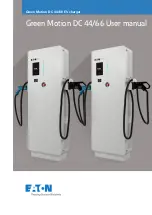
1
START-IT
™
MANUAL BATTERY CHARGER
OWNER’S MANUAL & WARRANTY INFORMATION
6/2 AMP – BATTERY CHARGER FOR 6 AND 12 VOLT DC BATTERIES
VEC072
SAVE THESE INSTRUCTIONS -
1. WORKING IN VICINITY OF A LEAD-ACID BATTERY IS DANGEROUS. BATTERIES
GENERATE EXPLOSIVE GASES DURING NORMAL BATTERY OPERATION. FOR THIS
REASON, IT IS OF UTMOST IMPORTANCE THAT EACH TIME BEFORE USING YOUR
CHARGER, YOU READ THIS MANUAL AND FOLLOW THE INSTRUCTIONS EXACTLY.
2. To reduce risk of battery explosion, follow these instructions and those published
by the battery manufacturer and the manufacturer of any equipment you intend
to use in vicinity of battery. REVIEW CAUTIONARY MARKINGS ON THESE
PRODUCTS AND ON ENGINE.
4140 SW 28TH WAY, FT. LAUDERDALE, FL 33312 • TEL: 945-584-4446 • FAX: 954-584-5556 • TOLL-FREE: 866-584-5504
• IMPORTANT SAFETY INSTRUCTIONS •
This manual contains important safety and operating instructions for battery charger Model VEC072
GENERAL BATTERY SAFETY:
1. Use charger for charging a LEAD-ACID battery only. It is not intended to supply power to a low
voltage electrical system other than in an automotive application. Do not use battery charger for
charging dry-cell batteries that are commonly used with home and portable appliances. These
batteries may burst and cause injury to persons and damage to property.
2. Use of an attachment not recommended or sold by the battery charger manufacturer may result in
a risk of fire, electric shock, or injury to persons.
3. To reduce risk of damage to electric plug and cord, pull by plug rather than cord when
disconnecting charger.
4. An extension cord should not be used unless absolutely necessary. Use of an improper extension
cord could result in a risk of fire and electric shock. If extension cord must be used, make sure:
a.That pins on plug of extension cord are the same number, size, and shape as those of plug
on charger.
b.That extension cord is properly wired and in good electrical condition; and
c. That wire size is AWG #18 (18 gauge) to 100 feet and AWG #16 for distances over 100 feet.
5. Do not operate charger with damaged cord or plug - replace the cord or plug immediately.
6. Do not operate charger if it has received a sharp blow, been dropped, or otherwise
damaged in any way; take it to a qualified service technician.
7. Do not disassemble charger; take it to a qualified service technician when service or repair is required.
Incorrect reassembly may result in a risk of electric shock or fire.
8. To reduce risk of electric shock, unplug charger from outlet before attempting any maintenance or
cleaning. Turning off controls will not reduce this risk.
9. Do not expose charger to rain or snow.
10.Never charge a frozen battery.






























